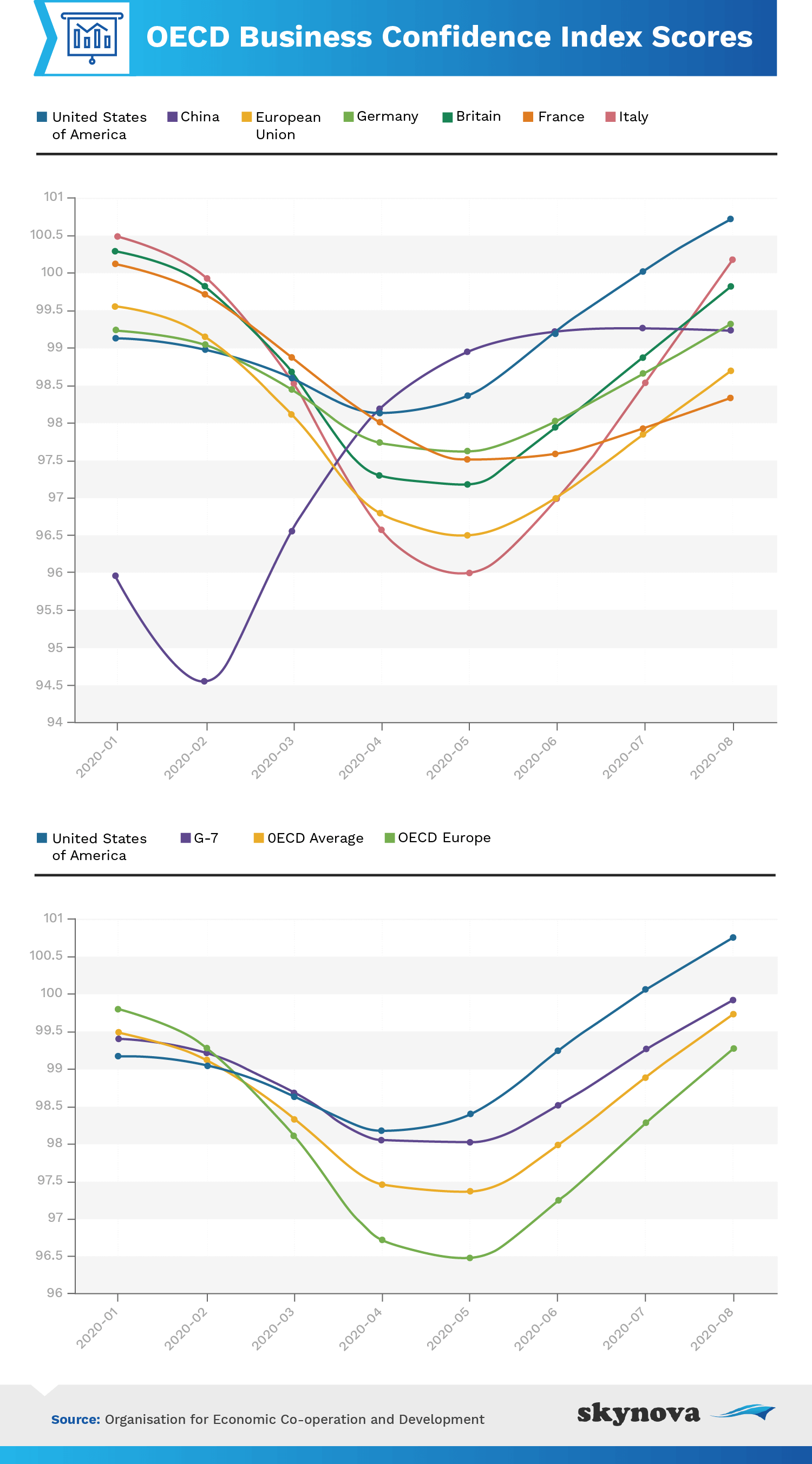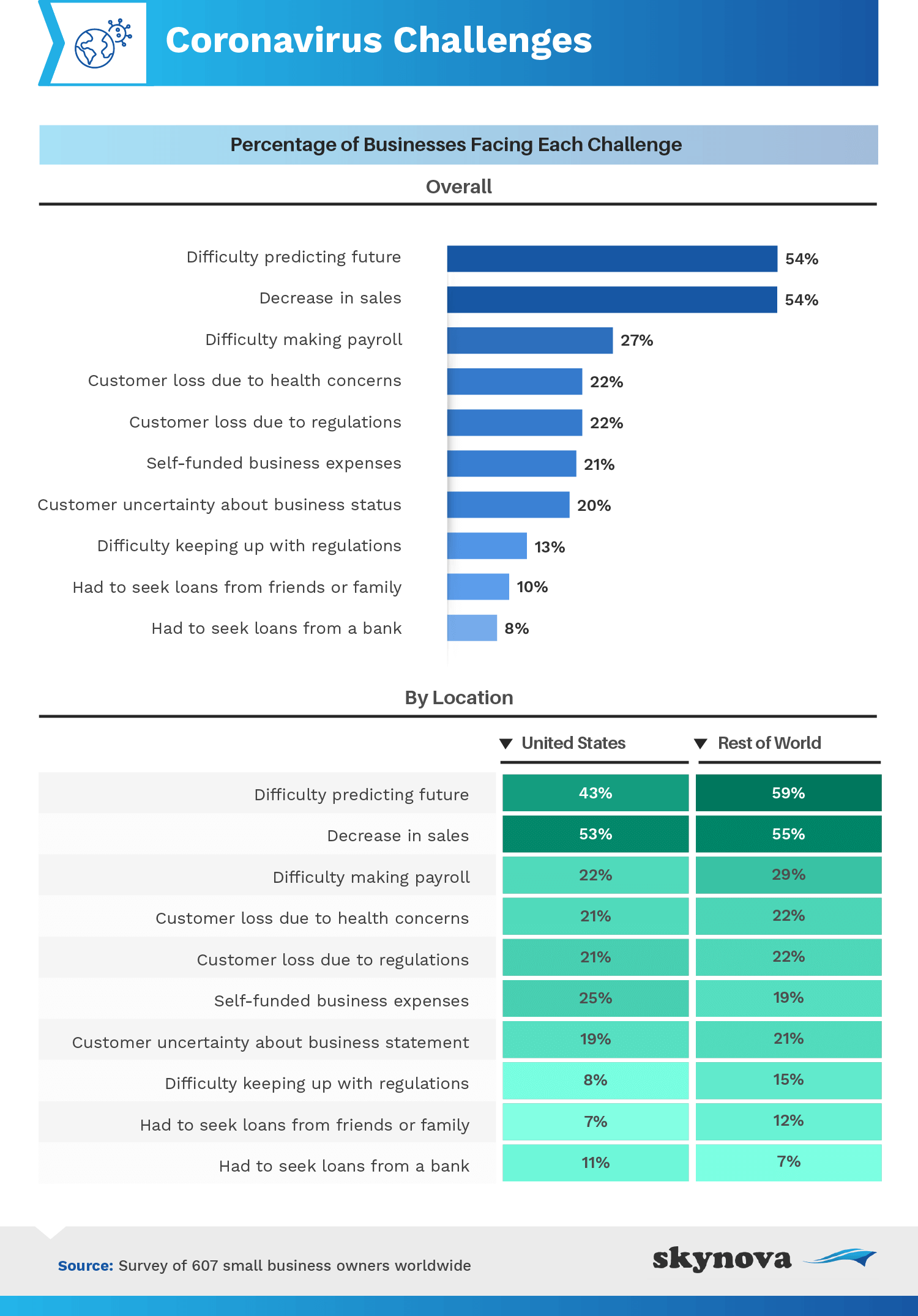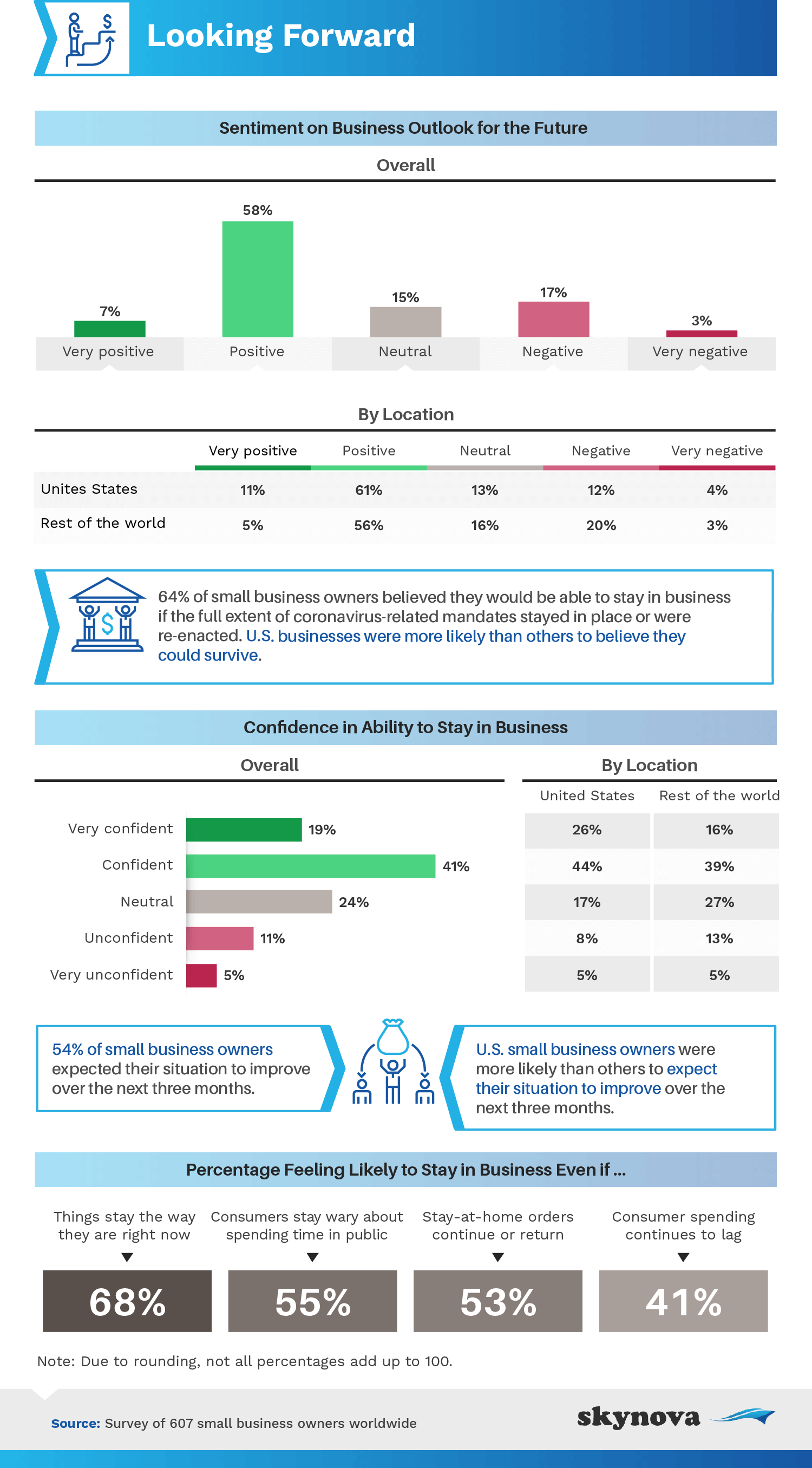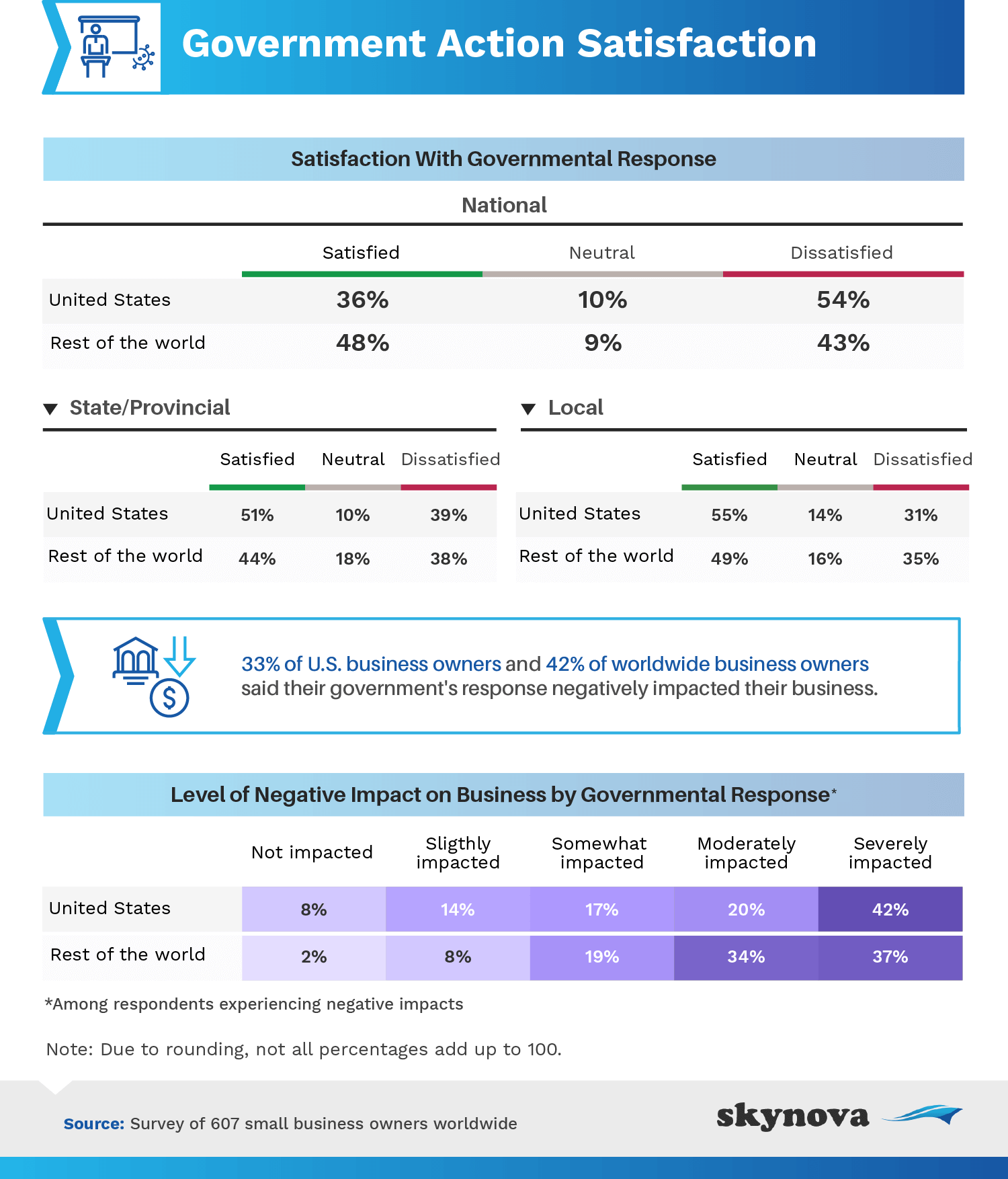
|
In May 2020, unemployment claims in the U.S. reached 30 million. And while states have been working toward a pathway to reopening and a new normal in the months that followed, as many as 1 in 3 jobs still remained vulnerable due to the COVID-19 pandemic.
Small businesses in the United States (those identified as having 500 employees or less) provided nearly half of all private sector jobs prior to COVID-19, but these firms have also been the most negatively impacted by the pandemic. More specifically, half of all businesses with fewer than 100 employees have been in danger as a result of the pandemic.
Considering how crucial small businesses are to the U.S., their health and success impact millions of Americans across the country. To better understand the state of small businesses and how American businesses are performing compared to the rest of the world, we surveyed over 600 business owners in the U.S. and worldwide, including over 400 international business owners from countries including Canada, the United Kingdom, Spain, Italy, Portugal, and more. Read on as we explore how many businesses are operating at full or limited capacities, are currently profitable, or are struggling to pay their employees and how they feel about the security of their business in the future.
They may get less attention than major big-brand companies that have declared bankruptcy during the COVID-19 pandemic, but thousands of small businesses are still shuttering across the country, and many will never reopen again. Still, small businesses in the U.S. may be in a better position for recovery than small business owners in other parts of the world.

Forty-nine percent of business owners indicated being open at full capacity at the time of our survey, including 51% of business owners in the U.S. and 48% of business owners in other parts of the world. Compared to 39% of business owners who reported being open in a more limited capacity, 10% indicated they were temporarily closed, and 1% of small business owners said they closed permanently due to the pandemic.
Among those businesses currently open and operating, 65% indicated they were still profitable, including 68% of small business owners in the U.S. and 63% of business owners from other countries. International business owners were also 5 percentage points more likely to indicate their businesses were nonprofitable as a result of COVID-19.
For many business owners, being open in 2020 also means adjusting to the new normal for their daily operations. Sixty-four percent of businesses earning a profit indicated they were impacted by social distancing mandates, stay-at-home recommendations from their government, and limited operations for some business types. A vast majority of profitable businesses also benefited from tax relief for individuals (75%), nationalization of payroll (70%), and tax relief for businesses (70%).
Eighty-one percent of small business owners earning consistent revenue during the pandemic were also impacted by government policies banning large gatherings; having restaurant capacities limited (78%) and stay-at-home recommendations (78%) were also cited as impactful.
For some additional context regarding global business sentiment during the pandemic, we explored the OECD’s (Organisation for Economic Co-operation and Development) Business Confidence Index data. According to the OECD, "This business confidence indicator provides information on future developments, based upon opinion surveys on developments in production, orders and stocks of finished goods in the industry sector. It can be used to monitor output growth and to anticipate turning points in economic activity. Numbers above 100 suggest an increased confidence in near future business performance, and numbers below 100 indicate pessimism towards future performance."

For many business owners, navigating the new normal didn’t come with an instructional manual, and the next steps may feel murky. More than half of global business owners indicated they didn’t know what to expect from the future and that they were suffering a decrease in sales.

While 54% of small business owners reported feeling it would be difficult to predict the future and equally as many indicated they were managing a decrease in sales, business owners in the U.S. described a better outlook than the rest of the world. Compared to 59% of international business owners, just 43% of U.S. business owners polled suggested they had difficulty predicting the future.
U.S. business owners were also 2 percentage points less likely to report a decrease in sales, 7 percentage points less likely to experience difficulty making payroll, and 1 percentage point less likely to lose customers due to health concerns. U.S. business owners were also 7 percentage points less likely to have difficulty keeping up with regulations and 5 percentage points less likely to seek loans from their friends or family. In contrast, American business owners were 4 percentage points more likely to seek loans from a bank to cover the added expenses of COVID-19.
Despite the unprecedented circumstances and the unknown roads ahead, a majority of small businesses have a positive outlook on the future and agree that if a pandemic like COVID-19 were to happen again, they would be much better prepared to navigate it.

Fifty-eight percent of small business owners indicated they felt positive about the future, including 61% of business owners from the U.S. and 56% from other countries around the world. And while 7% of small business owners felt very positive about the future, business owners in the U.S. (11%) were far more likely to have this hopeful perspective, compared to international business owners (5%).
Although 17% of small business owners (including 12% of Americans and 20% of international business owners) indicated they felt negatively about the future, 64% also reported they believed they would be able to stay open if COVID-related mandates persisted or were reenacted.
Despite the impact of COVID-19 precautions and mandates, 54% of business owners expected their situations to improve over the next three months. Overall, 41% of business owners were confident in their ability to stay in business, and 19% were very confident. Optimism for the future and confidence that their businesses would survive were more common among owners in the U.S., compared to those from other countries.
Despite feeling more positive about the future and confident in their ability to weather the storm caused by COVID-19, small business owners in the U.S. were more likely to be unhappy with the response and support from their government, compared to international business owners.

On a national level, 48% of business owners reported feeling satisfied with the response from their government in managing the COVID-19 pandemic, while 54% of U.S. business owners reported feeling dissatisfied instead. While American business owners were more unhappy with the national government’s response to the pandemic, they were far more likely to be satisfied with the state (51%) and local government (55%) response instead.
Still, compared to 42% of worldwide business owners, just 33% of U.S. business owners said their government’s response negatively impacted their business. Among those experiencing a negative impact from their government’s decisions or mandates, 42% of U.S. business owners and 37% of international business owners reported that impact as severe.
While many small businesses, both in the U.S. and around the world, are open in some capacity, more than 1 in 3 small business owners admitted they weren’t currently profitable, and nearly as many were struggling to continue paying their employees.
U.S. business owners were more comfortable looking ahead to the future and more likely indicated their businesses could survive if the regulations put in place as a result of COVID-19 were extended. Many business owners feel positively about the future and confident in their ability to stay in business, but some are still worried. Just 41% of business owners believe they’ll be able to survive if consumer spending continues to lag. Compared to the rest of the world, U.S. business owners were more satisfied with the responses from their state and local governments than they were with the national government, where more than half expressed their dissatisfaction with the way COVID-19 has been handled.
Skynova provides online software for small businesses, including invoices, accounting, time sheets, and more. We also write in-depth articles about various topics we, and hopefully our customers, find interesting and important. These articles usually have a business or workplace angle, often exploring how business and finance intersect with other aspects of life. The articles are based on surveys, statistics, and research conducted by Skynova.
We surveyed 607 international owners of small businesses. 198 respondents lived in the United States, and 409 lived in other countries, including the following: Belgium, Canada, Chile, Czech Republic, Denmark, England, Estonia, Finland, France, Germany, Greece, Hungary, India, Ireland, Israel, Italy, Japan, Latvia, Mexico, Netherlands, Norway, Poland, Portugal, Scotland, Slovenia, South Africa, South Korea, Spain, Sweden, United Kingdom, Venezuela, and Wales. Among respondents, 261 were female, 342 were male, and four did not identify as male or female. Our average respondent was approximately 34 years old.
To help ensure accuracy of data, all respondents were required to identify and correctly answer an attention-check question. In some cases, questions and responses were rephrased for brevity or clarity. These data rely on self-reporting, which carries limitations, such as telescoping and recency bias.
The success of small businesses impacts more than just business owners. Share the results of this survey with your readers for any noncommercial use by including a link back to this page in your story as credit to our team of contributors.